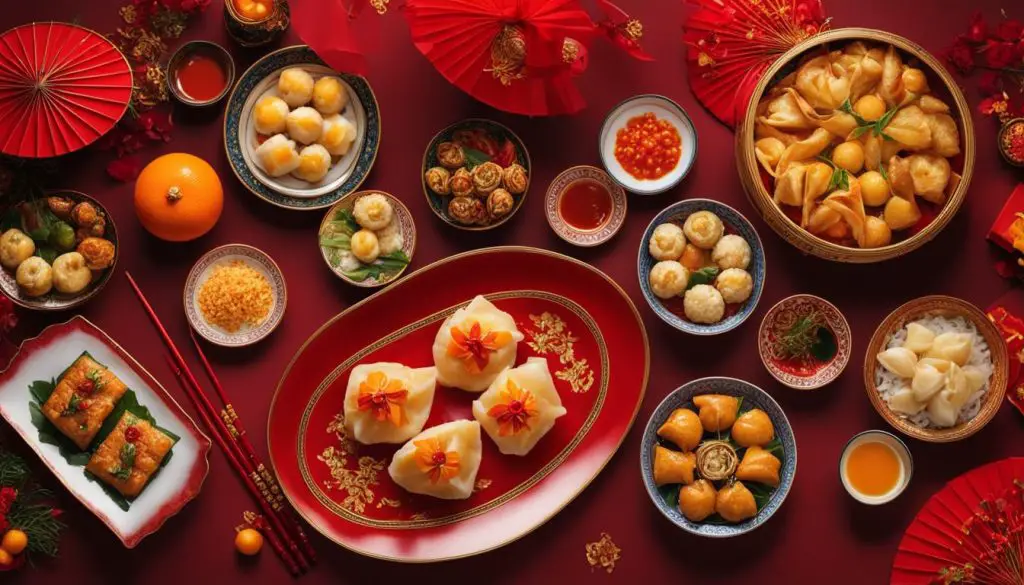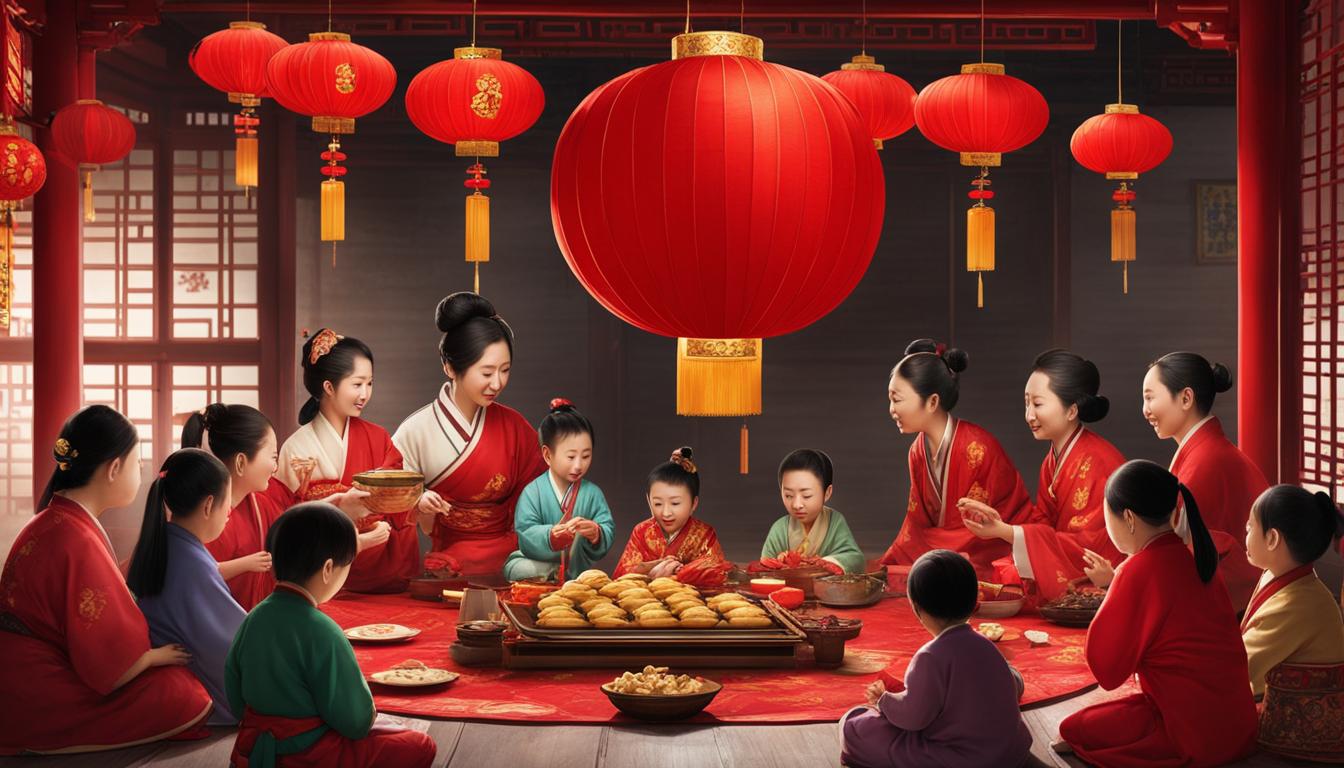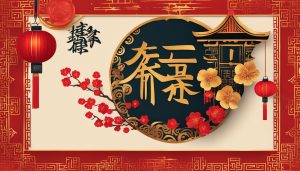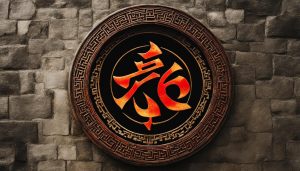Chinese New Year, also known as Spring Festival, is the most important event in the Chinese calendar. It is celebrated by millions of people in Eastern Asia and the Asian diaspora around the world. The festival lasts for 16 days, with the first week observed as a public holiday.
One of the traditions during Chinese New Year is to wish good luck to friends and family. Greetings such as “新年快乐” (xīn nián kuài lè) and “恭喜发财” (gōng xǐ fā cái) are commonly used to express well wishes for happiness and prosperity. It is believed that saying these greetings will bring good luck and fortune for the coming year.
Additionally, there are various customs and traditions associated with Chinese New Year, such as the use of red envelopes, the practice of not showering or sweeping during the festival, and the consumption of dumplings, which are considered a symbol of good luck.
Contents
Key Takeaways:
- Chinese New Year is the most important event in the Chinese calendar.
- Wishing good luck is a common tradition during Chinese New Year.
- Greetings like “新年快乐” and “恭喜发财” are used to express well wishes.
- Chinese New Year customs include the use of red envelopes and the practice of not showering or sweeping.
- Dumplings are considered a symbol of good luck during Chinese New Year.
Chinese New Year Symbols and Superstitions
Chinese New Year is a time filled with symbols and superstitions that are believed to bring good luck and ward off bad luck. These traditions and beliefs are deeply rooted in Chinese culture and have been passed down through generations. Understanding the significance of these symbols and superstitions adds to the richness of the Chinese New Year celebration.
Chinese New Year Symbols
During Chinese New Year, the color red takes center stage as a prominent symbol. Red is believed to scare away a legendary monster named Nian and is associated with good luck and prosperity. You will see red lanterns, red decorations, and people wearing red clothing during the festive period. Another significant symbol is the Chinese zodiac animal associated with the year. Each year is assigned a different animal from the zodiac cycle, and it is believed that if the year corresponds to your zodiac animal, you may experience bad luck. To counteract this, wearing something red is said to bring good fortune.
Chinese New Year Superstitions
Superstitions play a big role during Chinese New Year. They are believed to bring good luck and ensure a prosperous year ahead. One popular superstition is the practice of not showering or sweeping during the festival as it is believed to wash away good luck. Another widely observed tradition is the exchange of red envelopes containing money. These red envelopes, known as “hongbao,” symbolize blessings and good wishes for the recipient. They are given to children, unmarried adults, and employees as a gesture of good luck and prosperity.
A Complete Table
Here’s a comprehensive table summarizing some of the key symbols and superstitions associated with Chinese New Year:
| Symbol/Supertition | Meaning/Significance |
|---|---|
| Color Red | Scaring away bad luck, happiness, and prosperity |
| Chinese Zodiac Animal | Associated with the year and brings good fortune or potential challenges |
| Not Showering or Sweeping | Avoiding the washing away of good luck and fortune |
| Red Envelopes (Hongbao) | Symbolize blessings and good wishes for the recipient |
Chinese New Year Traditions and Customs
Chinese New Year is a time for family reunions and festivities. Traditional customs and practices are followed to ensure a prosperous and auspicious year ahead. Some of these customs include thorough cleaning of the house before the festival to sweep away any bad luck, decorating the home with red banners and paper cuttings with auspicious messages, and setting off firecrackers and fireworks to ward off evil spirits. The reunion dinner on New Year’s Eve is a highlight of the celebration, where families gather to enjoy a lavish meal together. Other traditions include visiting temples to pray for blessings, watching the “Chun Wan” or Spring Festival Gala, which is a variety show aired on television, and exchanging gifts and greetings with family and friends. It is also common to wear new clothes to symbolize a fresh start for the new year.
One of the most important customs during Chinese New Year is the giving and receiving of red envelopes, also known as “hongbao” in Mandarin. These envelopes contain money and are given as gifts to children, unmarried adults, and employees. The red color of the envelopes is believed to bring good luck and ward off evil spirits. The amount of money inside varies but is usually a symbolic gesture rather than a large sum. The exchange of red envelopes signifies blessings and good wishes for the recipient’s health, wealth, and success in the coming year.
Another significant tradition is the lion dance, which is performed to scare away evil spirits and bring good luck and fortune. The lion dance involves two performers dressed in a lion costume, one controlling the lion’s head and another controlling the lion’s body. The performers mimic the movements of a lion, accompanied by the beat of drums and cymbals. The dance is believed to bring joy and prosperity to the community and is often performed during street parades and temple celebrations.
Table: Symbolism in Chinese New Year Customs and Traditions
| Custom/Tradition | Symbolism |
|---|---|
| Red Envelopes | Good luck, blessings, and prosperity |
| Lion Dance | Scaring away evil spirits, bringing joy and prosperity |
| Thorough Cleaning of the House | Sweeping away bad luck, making room for good fortune |
| Reunion Dinner | Family unity and abundance |
| Visiting Temples | Praying for blessings and good fortune |
Chinese New Year is a time to honor ancestors and pay respects to deities. Many families set up an ancestral altar in their homes and offer food, incense, and other offerings to their ancestors. It is believed that by doing so, the ancestors will bless the family and bring them good fortune for the coming year. Additionally, families will visit temples to offer prayers and seek blessings from the gods and goddesses.
The traditional customs and rituals of Chinese New Year not only reflect the rich cultural heritage of the Chinese people but also serve as a way to bring good luck, happiness, and prosperity into the lives of those who celebrate this auspicious occasion.
Chinese New Year Food and Festive Rituals
Chinese New Year is a time of celebration and festivity, and food plays a significant role in these joyful traditions. Various dishes are prepared during this auspicious occasion, each carrying its own symbolization of good luck and prosperity.
One staple of Chinese New Year cuisine is dumplings. These delicious morsels, usually filled with meat and vegetables, are shaped like gold ingots, symbolizing wealth and prosperity. Eating dumplings during the festival is believed to bring good fortune and abundance for the coming year. Another popular dish is Niangao, a sticky rice cake made from glutinous rice flour. The name “Niangao” sounds similar to the Chinese phrase for “higher year,” signifying advancement and growth in life. It is often served as a symbol of reaching new heights in the new year.
Additionally, certain meats and fish are considered essential for a prosperous Chinese New Year feast. Poultry, such as chicken and duck, symbolize unity and togetherness, while fish represents abundance and surplus. Common preparations include steamed whole fish, symbolizing a well-rounded and complete year, and roasted poultry, representing an auspicious start.
| Chinese New Year Dishes | Symbolization |
|---|---|
| Dumplings | Wealth and prosperity |
| Niangao (sticky rice cake) | Advancement and growth |
| Poultry (chicken, duck) | Unity and togetherness |
| Fish | Abundance and surplus |
Alongside the delectable food, Chinese New Year is also marked by festive rituals believed to bring good luck and ward off negative energies. Symbolic decorations are placed throughout homes and streets, such as red lanterns and couplets. These vibrant displays are meant to scare away evil spirits and usher in a year of good fortune. Lion and dragon dances are also performed during parades and gatherings, bringing joy and spreading positive energy.
As the night sky lights up with colorful fireworks and firecrackers, the crackling sounds are said to scare away evil spirits. This spectacle is not only a visual delight but also an essential ritual to ensure a prosperous year ahead. By participating in these festive rituals, families and communities come together to celebrate the arrival of the new year and embrace the traditions that have been passed down for generations.

Chinese New Year Food and Festive Rituals: A Feast for the Senses
The Chinese New Year is a feast for the senses, with tantalizing aromas, vibrant colors, and rich symbolic meanings behind every dish and ritual. From the humble dumpling to the elaborate dragon dance, each element of the celebration carries deep-rooted traditions and blessings for a prosperous year ahead. So, gather your loved ones, savor the delectable flavors, and immerse yourself in the joyous atmosphere of Chinese New Year.
Conclusion
Chinese New Year is a time of joy, reunions, and well wishes for happiness and prosperity. The festival is filled with traditions, symbols, and customs that have been passed down for generations. From exchanging red envelopes to enjoying festive meals and participating in cultural rituals, the Chinese New Year is a time to celebrate and embrace Chinese culture.
By immersing yourself in the vibrant festivities, you can experience the sense of community and belonging that Chinese New Year brings. Whether it’s watching the spectacular lion and dragon dances or savoring the delectable traditional dishes, the celebrations create unforgettable memories. The exchange of well wishes and greetings also adds a heartwarming touch to the occasion, fostering a spirit of goodwill and positivity.
So, the next time someone asks, “Do you wish good luck on the Chinese New Year?”, you can confidently answer yes and join in the festivities of this auspicious occasion. Immerse yourself in the rich tapestry of Chinese traditions and create lasting memories with your loved ones. Embrace the joy, reunions, and well wishes for happiness and prosperity that define the Chinese New Year celebration.
FAQ
Do you wish good luck on the Chinese New Year?
Yes, it is a tradition during Chinese New Year to wish good luck to friends and family. Greetings such as “新年快乐” (xīn nián kuài lè) and “恭喜发财” (gōng xǐ fā cái) are commonly used to express well wishes for happiness and prosperity.
What are some Chinese New Year traditions and customs?
Chinese New Year is filled with customs and traditions. Some of the notable ones include the use of red envelopes, not showering or sweeping during the festival, and the consumption of dumplings, which are considered a symbol of good luck.
What are some Chinese New Year symbols and superstitions?
Chinese New Year is filled with symbols and superstitions believed to bring good luck and ward off bad luck. The color red is a prominent symbol, and each year is associated with a different Chinese zodiac animal. Other superstitions include not showering or sweeping and the practice of giving and receiving red envelopes.
What are some festive rituals and food associated with Chinese New Year?
Festive rituals during Chinese New Year include thorough cleaning of the house, decorating with red banners and paper cuttings, and setting off firecrackers and fireworks. Traditional foods include dumplings, Niangao (New Year rice cake), spring rolls, and specially-cooked poultry and fish. There are also rituals such as hanging red lanterns, performing lion and dragon dances, and lighting fireworks and firecrackers.
What is the significance of Chinese New Year?
Chinese New Year is a time of joy, reunions, and well wishes for happiness and prosperity. The festival is filled with traditions, symbols, and customs that have been passed down for generations. It is a time to celebrate and embrace Chinese culture.





